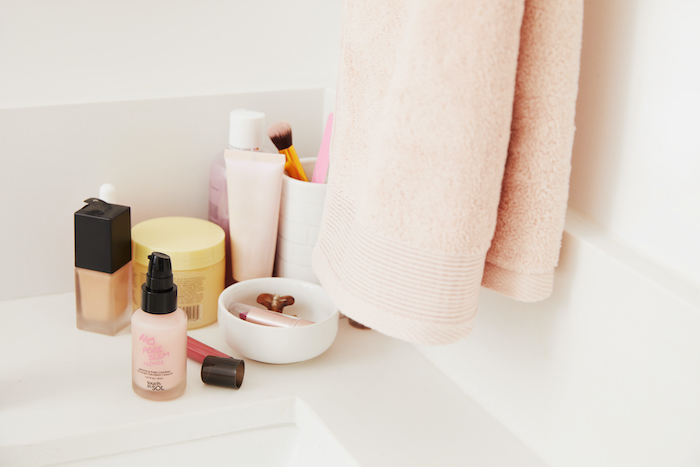
In the beauty world, we’re faced with many how-to’s and beauty information. Whether that’s how to plump lips or how to fill in eyebrows, there’s a lot of information out there. But when it comes to skin care and hair care, we love all of the information we can get for healthy hair and skin.
Let’s face it: our hair puts up with a lot, and too many treatments in too short a time frame can damage your once silky smooth hair.
If you’re looking for a way to give your damaged hair some long-overdue TLC, a hair mask is an effective way to condition, repair, and revitalize your locks. After all, hair care is just as important as skin care. With so many different options to choose from, however, you might be wondering, what does a hair mask do?
Without question, a hair mask is a highly effective way to give your hair some sweet relief and say sayonara to split ends. Ahead, we’ll talk about all the hair mask benefits you have to look forward to.
#1 A Boost of Moisture
One of the main benefits of hair masks is that they provide plenty of moisture, which is vital to improving the appearance of brittle, damaged strands. Moisture plumps up those delicate strands to give you a head full of healthy-looking hair.
For extra-hydrated hair, try a mask formulated for overnight use to give your strands some long-lasting deep conditioning. For hair that looks as soft and luscious as it feels, lean towards hair masks with plenty of hydrating properties and vitamins, like:1
- Argan oil
- Aloe vera gel
- Coconut oil
- Shea butter
Product Recommendation: We can’t get enough of the VOCÊ Hydrate Mask, jam-packed with shea butter as well as hibiscus extract and baobab for stronger hair.
#2 Touchably Soft Texture
Anyone with colored, bleached, chemically altered, or heat-treated hair can tell you that while these techniques are effective at nailing a certain look, they can leave your hair feeling dry and brittle. A hair mask can be a wonderful way to improve hair texture, as the conditioning ingredients will leave it feeling softer and smoother than before. So, when you run your hands through your perfectly styled hair, you’ll love how it feels and not just how it looks.
#3 Farewell to Frizz
While some people have naturally frizzy hair, frizz can also result from damaging hair tools, treatments, and products that reduce the moisture in your hair. Giving your hair an infusion of moisture via hair masks can help lessen frizz all around.
Ingredients to look for in a de-frizzing hair mask include any that promote hydration, such as:2
- Shea butter
- Jojoba oil
- Aloe vera
While frizz can occur at any time of the year, a frizz-fighting hair mask can be particularly helpful during hot, humid summers. However, hydrating hair masks can also reduce frizz caused by static electricity in the winter months, when there’s less moisture in the air, making hair masks a powerful year-round solution.
#4 Increased Shine
Dreaming of glossy, gleaming locks? Even if your hair is damaged, a little extra moisture from a hair mask can go a long way toward increasing your hair’s shimmer and shine. Hair that’s been bleached or colored can benefit the most from a mask designed to help it shine, as the follicles are more porous than untreated hair — meaning they’ll easily soak up all that good stuff.
Many hair mask ingredients are good for shine, but you can especially benefit from the following:
- Honey
- Aloe
- Bamboo extract
- Coconut
If you’ve been using a lot of other products to revive your damaged hair, you may also benefit from a hair mask designed to clarify. Clarifying treatments help remove buildup of products, an essential step to enhancing your hair’s luster.
Product Recommendation: We love the Christophe Robin Regenerating Hair Mask, designed to increase shine for those with dry, damaged hair.
#5 A Healthier Scalp
A dry, itchy scalp and dandruff often come hand in hand with damaged hair, as the styling and coloring techniques used to achieve your desired look can also irritate and dry out the sensitive skin on your head.
Apart from applying moisture, some hair mask ingredients help you stop scratching with the use of antibacterial and anti-inflammatory ingredients. One especially useful ingredient is tea tree oil, an essential oil proven to help treat dandruff.3
A healthy hair and scalp may also encourage hair growth, especially if scalp exfoliation is included to free any buildup clogging each hair follicle.
#6 A Break Up With Breakage
Some natural hair breakage is unavoidable. It can happen when we brush our hair, tie it up, and, especially if it’s long, snag it on our clothes and other things around us. When your hair’s already damaged and dry, however, you may notice quite a bit more breakage.
Hair masks can help reduce your hair breakage woes by supplying plenty of moisture and hair-strengthening ingredients. Science tells us that hair treatments using natural oils are especially effective at stopping breakage and split ends from showing up in the first place.
Look for ingredients like:4
- Sunflower oil
- Coconut oil
- Argan oil
- Olive oil4
In terms of strengthening your strands, hair masks that contain keratin are also known to deliver plenty of fortifying benefits.
#7 Fewer Tangles
Does styling your hair quickly turn into a fight between you and your strands, with a plastic comb as your only weapon? Yup, a hair mask can help.
Next time you’re trying to detangle your damp hair, apply a mask before using a wide-tooth comb to gently undo those knots, starting at the ends and working your way up. In terms of preventing tangles from forming in the first place, a hair mask can help by keeping your locks smooth and slippery, meaning that your days ahead will be free from the frustrations of knots, twists, and snarls.
Fighting with your tangled hair can also create hair damage, like breakage, especially on damp or wet hair. So applying a hair treatment will prevent such damage.
How to Use a Hair Mask
If you’re drooling over all the benefits of hair masks, we’re right there with you. For those who’ve never used one before, though, you might wonder how a hair mask differs from your regular conditioner or leave-in conditioner. Say no more! We’ll guide you through all the steps you need to take to achieve healthy, happy hair.
Your hair mask will generally come with instructions specific to its unique ingredients. Usually, however, you can apply it according to one of three methods:
- Apply in the shower – Most masks work best on damp hair and can be easily added to your shower routine. A mask is also likely to work best on fresh, clean hair that’s free of buildup and other products. After shampooing, squeeze the excess water out of your hair and work your mask from roots to ends. Let it sit for at least 10 to 15 minutes, and in the meantime, give yourself a spa-level scrub, soap, or shave. Then, just rinse your hair, and you’re all set!
- Apply to dry hair. Some oil-based masks work best on dry hair, as water can repel oils and prevent your hair from soaking up all that goodness. Brush your dry hair to remove any tangles, then work your mask into your hair from roots to tips. Put your hair up with a clip or wrap it in a T-shirt. You can leave your mask in anywhere from 20 minutes to a few hours, then simply follow your regular shower routine when you’re done.
- Apply overnight. An overnight mask application is a smart way to get in some extra-deep conditioning. Follow your hair mask’s instructions in terms of whether to apply it on damp or dry hair, and work it in thoroughly. Wrap your hair up with a towel or T-shirt, and head off to catch some Zs. In the morning, follow your regular shower routine.
A quick tip: If you’re using your mask on dry hair or overnight, you may want to use an extra towel or wear an old t-shirt to protect your clothes and bedding, as some of the oils and moisturizers that make your hair oh-so-luscious could also stain your fabrics.
How Often to Use a Hair Mask
Wow, you say as you gaze into the mirror at your newly lustrous hair. Can I use a hair mask every day?
The technical answer is yes. Since hair mask ingredients tend to be helpful and hydrating, you can use them fairly often without worrying about adverse effects. But because they pack quite a punch of moisture, using them daily could weigh down your hair more than you want.
Once you’ve acquired a hair mask or two to try, play around with frequency and see how your hair reacts. You may want to use a mask once or twice a week at first, but as you rehydrate and rejuvenate your damaged hair, you can try switching to every two weeks or once a month.
Other must-have hair products including oils, sprays, and shampoos can make a tremendous difference for healthy hair when paired with a mask.
Embrace Happy, Hydrated Hair Days with FabFitFun
Using a hair mask is a fabulous way to deliver plenty of health and hydration to any hair type. And with a shinier, more hydrated, frizz-free mane, you’ll be ready to let your hair down in all its glory, spending less time on detangling and more on, well, everything else!
Our suggestion? Try out a FabFitFun membership, our seasonal subscription box includes plenty of hair and beauty goods sent straight to your home each season.
As a FabFitFun Member, you’ll also enjoy plenty of perks, like customizing your choice of products and taking advantage of members-only sales. And with access to the member Community and FabFitFun TV, you’ll receive plenty more tips like the best colored eyeliner looks and creating a wellness routine to help you (and your hair) live your best life in no time.
Sources:
- NaturallyCurly. 7 Super Hydrating Ingredients for Natural Hair. https://www.naturallycurly.com/curlreading/curls/7-super-hydrating-ingredients-for-natural-hair
- Healthline. 18 Hair Mask Ingredients for Dry, Damaged Hair. https://www.healthline.com/health/beauty-skin-care/hair-mask-for-dry-hair
- PubMed. Treatment of dandruff with 5% tea tree oil shampoo. https://pubmed.ncbi.nlm.nih.gov/12451368/
- National Library of Medicine. Hair Cosmetics: An Overview. https://www.ncbi.nlm.nih.gov/pmc/articles/PMC4387693/




